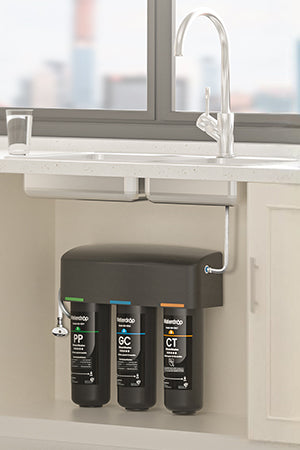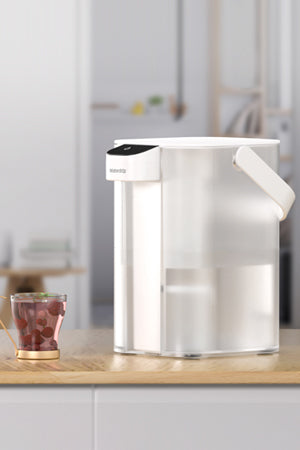Mineral water is more than just a fancy bottled drink—it's water that contains essential minerals and trace elements beneficial for your health. These minerals occur naturally when water flows through rocks and soil, picking up nutrients such as calcium, magnesium, potassium, and bicarbonates.
In Singapore, mineral water is widely available in supermarkets, convenience stores, and even vending machines. It's often seen as a healthier and more premium alternative to regular bottled or tap water. But is it really better for you? Let's explore.
How Is Mineral Water Different from Regular Drinking Water?
The key difference lies in mineral content.
Mineral water: Comes from natural underground sources and contains minerals in specific quantities.
Regular drinking water: May come from municipal supplies and is purified to remove contaminants, sometimes with minerals added back artificially.
Is Mineral Water Better than Tap Water in Singapore?
Tap water in Singapore is safe to drink, meeting
WHO standards . However, mineral water offers naturally occurring minerals that may enhance taste and provide additional health benefits.
Types of Mineral Water
Not all mineral water is the same. Here are the common types you'll find in Singapore:
Still Mineral Water
This is flat water with no carbonation. It's the most common type consumed daily.
Sparkling Mineral Water
This type contains natural or added carbonation, giving it a fizzy texture. Popular brands in Singapore include San Pellegrino and Perrier.
Fortified Mineral Water
Some bottled waters in Singapore are enriched with extra minerals such as zinc or selenium for added health benefits.
Common Minerals Found in Mineral Water
The exact mineral content varies depending on the source, but typical minerals include:
Calcium: Supports bone and teeth health.
Magnesium: Helps with muscle function and energy production.
Potassium: Maintains electrolyte balance.
Bicarbonates: Aid digestion.
Benefits of Drinking Mineral Water
- Better Hydration – The electrolytes in mineral water help replenish lost minerals during sweating.
- Improved Bone Health – The calcium content supports strong bones.
- Aids Digestion – Bicarbonates can help neutralize stomach acid.
- Enhanced Taste – Many people prefer the natural taste of mineral water over tap water.
Is Mineral Water Safe in Singapore?
Yes. In Singapore, bottled mineral water must comply with
Singapore Food Agency (SFA) regulations. The water must be sourced from approved natural springs and processed in a hygienic facility.
Mineral Water vs Tap Water in Singapore
Singapore's tap water is among the cleanest in the world. However, some households prefer mineral water due to taste, mineral benefits, or personal preference.
If you want the best of both worlds—safe water with minerals—you can consider filtration systems like the
Waterdrop Reverse Osmosis (RO) Water Filter , which removes impurities while preserving beneficial minerals. This way, you can enjoy mineral-like water straight from your tap without buying bottled water.
How to Choose the Best Mineral Water in Singapore
- Check the Mineral Content – Look for calcium, magnesium, and potassium.
- Consider the Source – Natural springs often provide higher-quality mineral water.
- Taste Preference – Some prefer still water, others like sparkling.
- Sustainability – Choose brands with eco-friendly packaging.
The Environmental Impact of Bottled Mineral Water
While bottled mineral water offers convenience, it also contributes to plastic waste in Singapore. Recycling helps, but using a home water filtration system is a more sustainable choice in the long run. A filter like the
RO System can give you high-quality, mineral-rich water without single-use bottles.
Conclusion
Mineral water offers a unique combination of hydration, taste, and health benefits. In Singapore, where tap water is already safe, choosing mineral water is often a matter of taste and lifestyle.
If you love the taste of mineral water but want to reduce costs and plastic waste, consider installing a
Waterdrop water filter at home. It provides clean, great-tasting water every day—without the need to carry heavy bottles from the store.
People Also Ask About Mineral Water
Q: Does boiling mineral water remove minerals?
Boiling mineral water is a common way to kill bacteria and viruses, but it doesn't significantly remove the minerals. Essential minerals like calcium and magnesium remain intact after boiling because they are stable at high temperatures.
However, if you boil water for a long time, you might notice a white residue left in your kettle or pot—that's just the mineral deposits (also called limescale), not a sign that the minerals are “lost.” In Singapore, where bottled mineral water is already safe, boiling is usually unnecessary unless you're concerned about possible contamination during storage or transport.
Q: Is sparkling mineral water bad for teeth?
Sparkling mineral water contains natural or added carbon dioxide, which makes it fizzy. This carbonation can slightly increase the acidity of the water, and over time, excessive consumption might contribute to enamel erosion.
That said, the effect is much milder compared to soft drinks or fruit juices, which have far higher acidity and sugar content.
For most Singaporeans who enjoy sparkling mineral water occasionally—perhaps during meals or as a soda alternative—it's perfectly fine. If you're worried about tooth health, drinking sparkling water with food and rinsing with plain water afterward can help reduce any risk.
Q: Can mineral water replace sports drinks?
For light activities like yoga, brisk walking, or a short jog along East Coast Park, mineral water is more than enough to keep you hydrated. Its natural electrolytes (such as magnesium and potassium) help replace the minerals lost through sweat.
However, for high-intensity workouts—like long-distance running in Singapore's humid climate or competitive sports—sports drinks may be more effective because they provide a higher concentration of electrolytes and carbohydrates for quick energy.
Q: Can you drink mineral water every day?
Yes, drinking mineral water daily is generally safe for most people. It can provide beneficial minerals that support bone, muscle, and heart health.
However, if the water is high in sodium, people with high blood pressure should limit their intake. Moderation is key, and alternating between mineral water and regular filtered tap water can help maintain a balanced diet.




































































